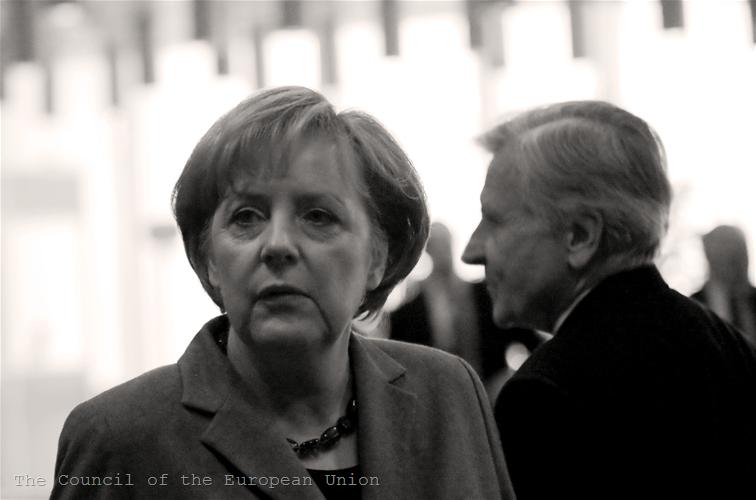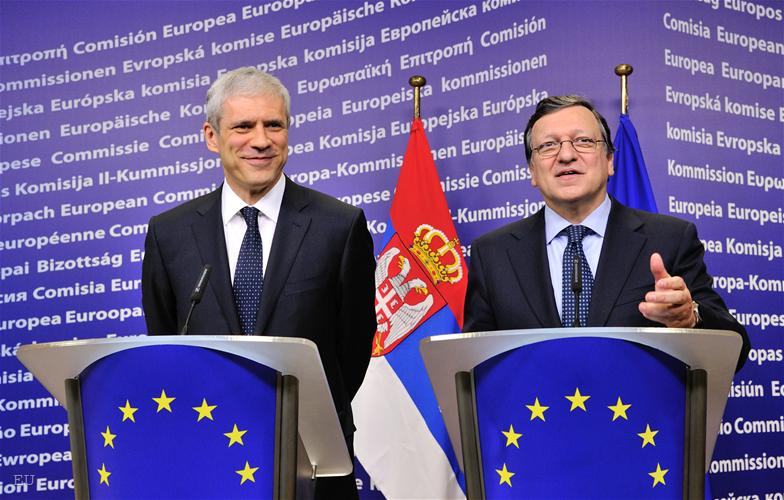The Eurogroup Decided to Allocate Half of the Second Greek Loan
Ralitsa Kovacheva, March 2, 2012
 After failing to meet the conditions of its creditors during the last two years, now Greece has managed to do so only in a few days, faced with the real imminence of a default. Apparently everyone have drawn the necessary lessons. Greece – that there is no free lunch, and the creditors - that money is not being given on the basis of trust, but for real actions.
After failing to meet the conditions of its creditors during the last two years, now Greece has managed to do so only in a few days, faced with the real imminence of a default. Apparently everyone have drawn the necessary lessons. Greece – that there is no free lunch, and the creditors - that money is not being given on the basis of trust, but for real actions.
When in the early afternoon of March 1 the eurozone finance ministers gathered in Brussels, each of them said that in any case there would be no final decision that evening on granting the second loan to Greece. But they noted that there were grounds for optimism:
German Finance Minister Wolfgang Schauble: "Of what I hear it looks like Greece has made large strides. That is why I think that we will take an important step forward."
IMF Managing Director Christine Lagarde: "I have a positive impression about the good work that has been done in the last hours."
Several hours later, it became clear that, according to the Troika report, "Greece has made sufficient progress in completing the agreed prior actions." Almost all the piece of legislation required by the lenders has been adopted in the areas of fiscal consolidation, revenue administration, pension reform, financial sector regulation and supervision and growth-enhancing structural reforms. And all this, after the final form of the second Greek programme, with all its conditions, has been approved at a Eurogroup meeting on February 20.
However, since only one of the conditions for Greece to get the loan has been fulfilled (the second is completion of the debt swap), the finance ministers decided only half of the loan to be disbursed.
 The ministers gave a green light to the rescue fund EFSF to trigger the elements of the agreement reached on 21 February in relation to the debt exchange. The EFSF must provide a 30 billion euros "sweetener" for the losses of private creditors, 5.5 billion euros for payment of the accrued interest on Greek government bonds and additional (not included in the loan) 35 billion euros for collateral enhancement in the Eurosystem (the system of the central banks of the eurozone).
The ministers gave a green light to the rescue fund EFSF to trigger the elements of the agreement reached on 21 February in relation to the debt exchange. The EFSF must provide a 30 billion euros "sweetener" for the losses of private creditors, 5.5 billion euros for payment of the accrued interest on Greek government bonds and additional (not included in the loan) 35 billion euros for collateral enhancement in the Eurosystem (the system of the central banks of the eurozone).
Thus Greek banks will have a guaranteed access to funding in the Eurosystem during the debt exchange exercise. Moreover, the credit rating agency Standard & Poor`s has already declared Greece in a "selective default". In parallel, the ministers agreed on a backstop facility for possible recapitalisation of Greek banks (23 billion euros, according to The Financial Times).
The rest of the 130 billion euros, agreed on 21 February, the 71.5 billion euros loan itself to the Greek  State, can be approved only after the second condition is met - successful completion of the deal with private creditors. As successful will be considered a participation rate over 66%. According to the eurozone finance ministers, the Greek authorities' offer to holders of Greek government bonds includes “sufficient attractive and unique features that should appeal to private creditors and ensure the broadest participation.” The expected effect of the bond swap is a debt reduction of about 100 billion euros, so the Greek debt to reach a sustainable level of 120.5% in 2020.
State, can be approved only after the second condition is met - successful completion of the deal with private creditors. As successful will be considered a participation rate over 66%. According to the eurozone finance ministers, the Greek authorities' offer to holders of Greek government bonds includes “sufficient attractive and unique features that should appeal to private creditors and ensure the broadest participation.” The expected effect of the bond swap is a debt reduction of about 100 billion euros, so the Greek debt to reach a sustainable level of 120.5% in 2020.
As Jean-Claude Juncker, the Eurogroup president, explained on 29 February, the first assessment of the debt exchange outcome would be made on 9 March. A few days later, the finance ministers will come up with a position on the basis of which the allocation of the entire loan will be decided. According to Mr Juncker, the first tranche of the loan must be disbursed on 20 March at the latest.
 | © The Council of the European Union
| © The Council of the European Union | © The Council of the European Union
| © The Council of the European Union Klaus Regling | © Council of the EU
Klaus Regling | © Council of the EU Mario Centeno | © Council of the EU
Mario Centeno | © Council of the EU Mario Centeno | © Council of the EU
Mario Centeno | © Council of the EU | © EU
| © EU